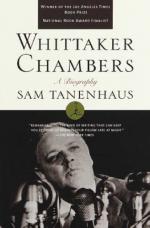|
This section contains 1,503 words (approx. 6 pages at 300 words per page) |

|
SOURCE: Horner, Charles. “Why Whittaker Chambers Was Wrong.” Commentary 89, no. 4 (April 1990): 56-8.
In the following essay, Horner assesses Chambers's work as a writer for Time and Life magazines, asserting that “although for some, Chambers's way of looking at things will retain its powerful emotional, intellectual, and aesthetic appeal, his sensibility never did have a wide following in the country.”
Whittaker Chambers (1901-61) was a Communist who left the party in 1938 to become one of its most determined enemies. He also became famous for his testimony against Alger Hiss, and was admired by many for Witness (1952), a compelling autobiographical account of his conversion/deconversion experience. In and of itself, a journey to and from Communism was not uncommon among American intellectuals; many toyed with it, fewer ended up as hard-core disciples, fewer still as operational agents under Soviet direction. In addition to having been a real spy, what made...
|
This section contains 1,503 words (approx. 6 pages at 300 words per page) |

|


